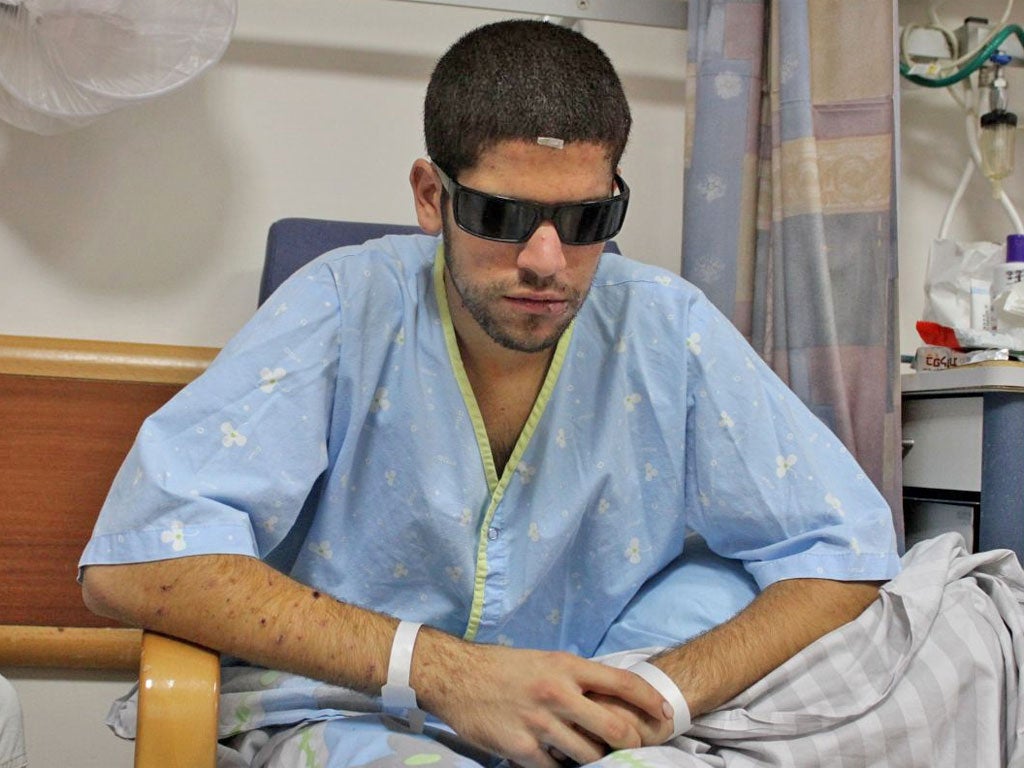His mother's from Surbiton but he was blown up near the border with Gaza
Family of British-Israeli soldier relive the attack that helped trigger the current crisis

Your support helps us to tell the story
From reproductive rights to climate change to Big Tech, The Independent is on the ground when the story is developing. Whether it's investigating the financials of Elon Musk's pro-Trump PAC or producing our latest documentary, 'The A Word', which shines a light on the American women fighting for reproductive rights, we know how important it is to parse out the facts from the messaging.
At such a critical moment in US history, we need reporters on the ground. Your donation allows us to keep sending journalists to speak to both sides of the story.
The Independent is trusted by Americans across the entire political spectrum. And unlike many other quality news outlets, we choose not to lock Americans out of our reporting and analysis with paywalls. We believe quality journalism should be available to everyone, paid for by those who can afford it.
Your support makes all the difference.Until last week, the British-Israeli soldier Shimon Alankri, 20, was in peak fitness, serving with the army's Sayeret Givati unit on routine patrol along Israel's border fence with Gaza. Then, on 10 November, a cell from the Gaza Popular Resistance Committees fired a guided anti-tank missile at his jeep. The missile blasted straight through the vehicle and out the other side, wounding them all.
It proved to be one of the triggers that led to Israel's Operation Pillar of Defence, a fierce offensive that has divided opinion abroad, but has proved deeply popular in Israel as the country heads towards elections in January.
After the attack, Mr Alankri, the unit's medic, started treating his injured colleagues. Suddenly, he couldn't see. At first he thought it was smoke, but it turned out to be blood pouring from a head wound and shrapnel in his eyes.
Within an hour, Mr Alankri was airlifted to an operating table in Soroka Hospital in Beersheba where surgeons spent six hours trying to save his sight and removing shrapnel from his eyes, skull and shoulder. His left eye is now stable.
On Monday, he has a second operation to save his right eye. He is in constant pain from wounds to his head and upper body, but glad to be alive.
Recovering in hospital yesterday, Mr Alankri relived the moments when he feared he might become the next Gilad Shalit, the French-Israeli soldier kidnapped in a similar attack. "There was a loud boom and lots of smoke," Mr Alankri told The Independent, speaking slowly and quietly, choosing his words with effort. "We didn't believe it had happened. We were shocked we had been hit. Then we immediately returned fire. When we realised what was going on we thought, what can we do? We've got to fight back."
Mr Alankri's mother, born Diana Morris from Surbiton in Surrey, said soldiers on patrol near Gaza were trained to respond immediately so they would not be kidnapped. "That's the nightmare," she said.
As a serving soldier, Mr Alankri cannot talk politics. But his father, Shalom, reflected the view of many Israelis – views that will not be lost on Prime Minister Benjamin Netanyahu as an election looms next year.
"They [Palestinians] have been firing at the area around Gaza every day," he said. "We don't know what they want. They spend all their money on weapons and rockets. Our people suffer and their people suffer. We've tried talking, we've tried everything but they use each ceasefire to re-arm. You can't have an entire country sitting in bomb shelters, unable to function. Israel has no choice now but to topple Hamas."
This reflects the general mood in Israel. While there have been some small demonstrations against the fighting in Tel Aviv, Nazareth, Umm el-Fahm and East Jerusalem, a poll conducted for Israel's Channel 10 TV found 91 per cent in favour of the offensive and 75 per cent saying it should continue.
That will please Mr Netanyahu, who faces re-election in January. Three of his predecessors who launched major military operations shortly before elections lost their jobs, in part because the offensives were seen as ineffective.
Join our commenting forum
Join thought-provoking conversations, follow other Independent readers and see their replies
Comments